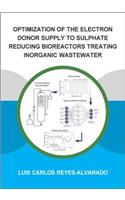
Optimization of the Electron Donor Supply to Sulphate Reducing Bioreactors Treating Inorganic Wastewater
Series: Ihe Delft PhD Thesis
The main objective of this research was to optimize the electron donor supply in sulphate reducing bioreactors treating sulphate rich wastewater. Two types of electron donor were tested: lactate and slow release electron donors such as carbohydrate based polymers and lignocellulosic biowastes. Biological sulphate reduction was evaluated in different bioreactor configurations: the inverse fluidized
NaN
VOLUME
English
Paperback

The main objective of this research was to optimize the electron donor supply in sulphate reducing bioreactors treating sulphate rich wastewater. Two types of electron donor were tested: lactate and slow release electron donors such as carbohydrate based polymers and lignocellulosic biowastes. Biological sulphate reduction was evaluated in different bioreactor configurations: the inverse fluidized bed, sequencing batch and batch reactors. The reactors were tested under steady-state, high-rate and transient-state feeding conditions of electron donor and acceptor, respectively. The results showed that the inverse fluidized bed reactor configuration is robust and resilient to transient and high-rate feeding conditions at a hydraulic retention time as low as 0.125 d. The biological sulphate reduction was limited by the COD: sulphate ratio ( 82% either using carbohydrate based polymers or lignocellulosic bio-wastes, in batch bioreactors. The biological sulphate reduction was limited by the hydrolysis-fermentation rate and by the complexity of the slow release electron donors.
Price Comparison [India]
In This Series
Bestseller Manga
Trending NEWS




















